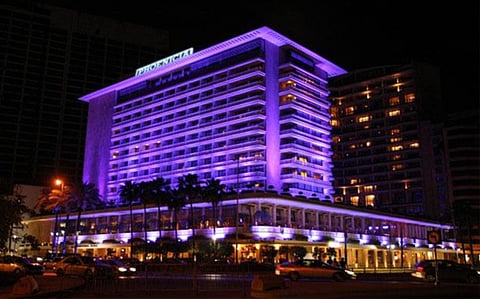Beirut’s iconic Phoenicia hotel in $100m debt
Outlook grim as Gulf states ban citizens from travelling to Lebanon due to political fallout

Beirut: Political instability, perpetual elite jockeying for false allegiances, and the spillover effects of unending regional confrontations are costing the Lebanese tourism sector a pretty penny. The latest victim, according to Al Akhbar, is the country’s premier hotel, the Phoenicia, which reportedly carried a $100-million debt burden.
The pro-Hezbollah daily confirmed what Ernst & Young’s Middle East hotel benchmark survey revealed a few weeks ago, namely that occupancy rates registered at barely 53 per cent in January 2016, up from 50 per cent in January 2015, but still woefully inadequate to save the declining tourism industry.
Among regional countries, Lebanon ranked ahead of Jordan and Kuwait, but lost to Bahrain, Dubai, Saudi Arabia, Qatar and Oman in the latest surveys, with the average room rate in Beirut now standing at $147, down from $181 a year ago, which is an 18.9 per cent decrease.
Al Akhbar reported that the “Societe des Grands Hotels du Liban,” which owned the Phoenicia and Vendome Intercontinental hotels in Beirut, conducted financial due diligence on the two properties’ respective operations, and concluded that it was imperative to restructure.
That, in effect, meant that dozens of employees would be let go, with the administration offering to pay a month’s salary for every year of employment, on top of an eight months’ severance package. According to the paper, some employees accepted these conditions that would avoid them being entangled in time-consuming trials, as they looked for alternative opportunities.
The head of the Lebanese Hotels’ syndicate, Pierre Ashkar, recently revealed that the industry suffered for at least the past five years with little or no efforts made by officials to focus on the country’s dire economic circumstances. In a statement to the Central News Agency, Ashkar called on the government to put its internal house in order and reminded his interlocutors that when the tourism sector elsewhere faces inevitable challenges because of instability, authorities introduce appropriate initiatives to help boost it again.
Ashkar hoped that “a miracle happens to save the coming summer season”, although few expected to see GCC tourists flock to Lebanon, especially now that several Arab Gulf states banned their citizens from travelling to Lebanon after a political fallout over Hezbollah dominance in the government.
While tourism accounted for approximately 10 per cent of GDP in 2015, Lebanon managed to attract nearly 1.5 million visitors each of the past few years, although these figures included Lebanese expatriates returning home for short visits.
In 2009, New York Times ranked Beirut as the number one travel destination worldwide due to its nightlife and hospitality, and while a sharp increase was recorded in 2009 — perhaps close to two million — significant declines have been recorded ever since, chiefly because wealthy GCC citizens stayed away.
Consequently, high-end properties fared poorly while low-end hotels that catered to displaced middle-class Syrian refugees managed to survive.
About the Phonecia
One of Beirut’s most prestigious addresses, the Phoenicia was built by Najib Salha, a banker who made his fortune in Saudi Arabia after the founder monarch replaced Abdallah Sulaiman with the Lebanese to draw up the kingdom’s first budgets in the late 1930s.
Salha founded La Société des Grands Hotels du Liban (SGHL) in 1953 and invested in the American designed property that highlighted Levantine influences in its high ceilings, sweeping staircases and palatial pillars.
The hotel opened to the public on December 23, 1961 as the Phoenicia Intercontinental, managed by the prestigious Pan American Airways chain at a time when air travel and five-star hotels were combined. With 310 rooms and suites, shops, restaurants and a swimming pool, the Phoenicia boasted Le Paon Rouge nightclub, which earned rave reviews for its top-of-the-line shows. Amazingly, and because of a near constant 100 per cent occupancy, Salha expanded the property with a 22-storey, 270-room addition, which opened on April 19, 1968.
At the height of the 1975-1990 Civil War, the Phoenicia was destroyed and stayed closed for nearly 25 years, but was rebuilt by Salha’s sons, Mazen and Marwan. The late 1990s’ investment of $100 million (DH367 million) restored the hotel to its majesty and it was reopened on March 22, 2000. It was damaged in the February 14, 2005 bombing assassination of Prime Minister Rafik Hariri, which occurred a few dozen feet from the property, but underwent a $50-million (Dh183.5-million) revamp in 2011 that coincided with its 50th anniversary.



